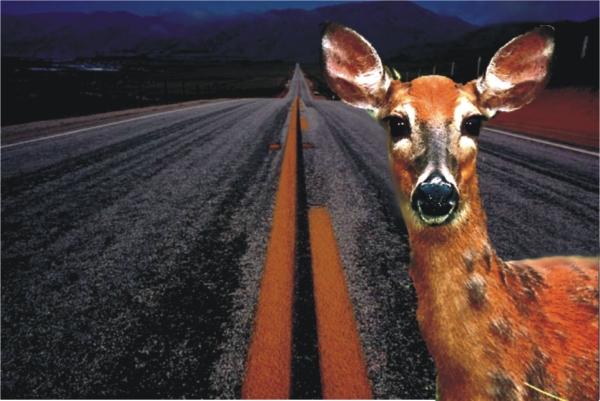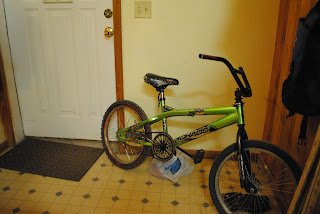 |
| Current view of the front porch of our building and the parking lot...snow! |
My friend Peter sent me an email this morning asking me a couple of questions about life here, so I thought I'd share my answers with you all. They seem like questions that many of you would ask. Peter asked me to blog about another topic, comparing my experiences of living in Occupied Palestine to living on the Pine Ridge Indian Reservation, and I'm still working that one out in my head. So, here you go, Peter!
How's life on the rez?
Life on the rez is good. Things are feeling better these days. I don't know if I've finally adjusted more or stopped resisting the move...or what, but life feels a bit more normal. I had a rough couple of weeks where I felt really out of sorts and like I wasn't "clicking" here. I should add that I am hyper self-aware, so I was still happy to be here and doing my work well, but I didn't feel as in-sync as I would have liked. I told my friend Vance the other day that since the last three months have shown me a lot of negatives, I'm hoping to pick up on more positives. We went to a Christmas program yesterday where I watched some of our young people perform different songs, including Jingle Bells in Lakota. Awesome, right??!!
Is rez politically correct?I'm not sure. People here use it a lot. One of the pastors in town wrote a book called "Rez Ramblings." So, I guess people use it. Someone told me recently that I have a "rez car." A lot of the cars around town are missing windows, including the front windshield, or seem to be held together by tape and bungee cords. "Rez car" doesn't sound like a compliment. Though, there are plenty of really nice cars around town--brand new SUVs, Lexus models, etc. I hope that they're describing my 2000 Chevy Cavalier as one of those rez cars.
Speaking of being PC, do people prefer to be called Indians?
Good question! A lot of people call themselves Indians here. Most say Indians and non-Indians or Indians and Wasichu (white people, but it really means "The one who takes all the meat.") I appreciate the irony when I, the vegetarian, am called Wasichu. I try to use "Natives" and "Lakota" when possible, but it always feels really awkward in conversations with the community here. There are a lot of sweatshirts around that say "Native Pride" and most formal things use "Lakota" or "Native."
Have you been un-PC so far?
Have I been un-PC? I'm not sure what that means exactly. I use "Indians" in conversations, since that's what people around me are using. I still use "Native" or "Lakota" mostly when talking to non-Natives. As with most titles, I find that the way a person uses it or the feelings behind how they use it determine the meaning, more than the word itself. The same goes for "rez." It's one thing for a bunch of 70 year-old grandmas to talk about themselves being "old Indians," but it's another for the US Government to call them Indians. This may sound like a double-standard, but part of being in a community of people means that you determine what language you want used for that community and that use for yourself. Before moving here, I really got into a habit of calling myself a Euro-American. This isn't to deny that I am a white person by color-definitions, even though I can get a mean sunburn. It's to acknowledge that I identify myself as having Euro-American heritage. The way that I process the world comes from a point of being a third and fourth-generation immigrant from Europe. This is different than someone who has had family in the United States for centuries and from someone who is first generation. Here, to call myself Euro-American, seems almost silly. The Lakota community knows that I am not Indian. It's pretty clear. In fact, the word wasichu is so often used in my presence, that I start to resent it. It's made me think a lot about how words and titles define and separate people from circles. My supervisor and I led a funeral a few weeks ago. My supervisor checked in with the family and decided that we would wait until a certain few family members arrived before starting it. One of the drummers had volunteered to act as the sort of MC, which is common at wakes and funerals here. Since the service was scheduled to start at 2pm, my supervisor went to ask him if everyone had shown up at 2:15pm. He announced to the whole crowd that we were on "white people time, so we better get moving!" My supervisor and I were in no rush, but our race was pointed out as to the reason why she was checking on family. I don't think it's a negative thing here, that my race is identified so openly, but it still makes me a little uncomfortable. It is what it is though. In a community where the wasichu have taken all the meat and where the white people continue to break promises with the Indians, then yes, I am an outsider. Yes, my skin resembles the people who have torn the land from the hands of my neighbors' ancestors and continue to take it out of their hands today. It makes me uncomfortable to be called white and wasichu all the time, because the history is uncomfortable and nasty.
Well, big thanks to Peter for some good questions that made me think and I hope provided some thoughts for y'all to mull over.












